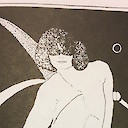Seen From the "L" / Rite of Spring
Seen From the "L" is from Barnes first collection of poetry, 1913
Seen From the "L" :
Barnes was born in 1892 into a complicated family. Her grandmother Zadel was a poet. Zadel knew Oscar Wilde's mother. Barnes' father was a polygamist who married-off his daughter Djuna at the age of 17 to the brother of his mistress. The marriage did not work. Barnes went off to Brooklyn where she put her talents to work as a writer and artist. She worked for a great number of newspapers and magazines. Her income helped support her troubled family. She wrote for:
- New York Tribune
- Bruno’s Weekly
- Pearson’s Magazine
- New York Morning Telegraph Sunday Magazine
- New York Sun Magazine
- New York Press
- New World Magazine
- The Brooklyn Daily Eagle
- New York World
- New York Morning Telegraph
- All-Story Cavalier Weekly
- Vanity Fair
- McCall's Magazine, which first sent Barnes to Paris.
Here is an excerpt from one of her interviews—
Woman Police Deputy is Writing Poetry (New York Sun Magazine)
Barnes:
And what do you think of crime, in general? To me personally it has a strong appeal—I like crime, provided it is properly committed.
Officer O’Grady:
That sounds nice, but or course that is the artist’s point of view.
later in the conversation...
Barnes:
…let us not get away from our subject, crime and death. Now death is something I am really keen about…
Officer O’Grady:
You are a funny girl… you love crime and now you adore death—I see you have an artist’s soul.
The opening song in this song cycle is “Seen From the ‘L’ ”, from Barnes very first collection of poetry, published by Guido Bruno when Barnes was 23 years old. The set is subtitled, Eight Rhythms and Five Drawings. Barnes later rejected these poems. Perhaps they are too self consciously demimondaine.
Nevertheless, there is hardldy anything so poignant as these words, the poem's coup de grace-->
Ravelling grandly into vice
Dropping crooked into rhyme.
Slipping through the stitch of virtue,
Into crime.
----the death and crime for which Barnes was so keen as a young lady.
Rite of Spring is a poem that is difficult to date because it evolved and appears in many versions of various lengths.
Seen From the “L”/Rite of Spring
SO she stands—nude—stretching dully
Two amber combs loll through her hair
A vague molested carpet pitches
Down the dusty length of stair.
She does not see, she does not care
It's always there.
The frail mosaic on her window
Facing starkly toward the street
Is scribbled there by tipsy sparrows—
Etched there with their rocking feet.
Is fashioned too, by every beat
Of shirt and sheet.
Still her clothing is less risky
Than her body in its prime,
They are chain-stitched and so is she
Chain-stitched to her soul for time.
Ravelling grandly into vice
Dropping crooked into rhyme.
Slipping through the stitch of virtue,
Into crime.
Though her lips are vague as fancy In her youth—
They bloom vivid and repulsive
As the truth.
Even vases in the making
Are uncouth.
Rite of Spring
Man cannot purge his body of its theme
As can the silkworm on a thread
Spin a shroud to re-consider in.
Resonances
There's a line from the great Irish playwright, John Millington Synge that Barnes quoted often:
"...there is no timber that has not strong roots among the clay and worms."
This also brings to mind the crux of Thomas Mann's novel, The Holy Sinner.
The pope-elect has been found on his little rock in the middle of a lake, where he exiled himself. A contingent from the vatican seek their new pope, led there by a dream. A fisherman's wife recalls her meeting with the strange one who would become pope.
"'Ah, holy lord," she sobbed, "I merit not your remembrance or your praise, for God knows my sin. When I protected you that day from the fisher's harsh words, he taxed me with wantonness and fleshly feeling for you and I denied the charge, falsely, as I now confess. For my eyes did really have to do with your limbs in the beggar's rags and with your noble features, and wantonness was at the bottom of the good I did you, depraved lost soul that I am!'
The pope-to-be replies:
'That is a small matter," answered Gregorius, "and not worth talking about. Seldom is one wholly wrong in pointing out the sinful in the good, but God graciously looks at the good deed even though its root is in fleshliness. Absolvo te.' These were his words. It was the first instance of the extraordinary clemency he was to display as Pope, so consoling to all men and only offensive to the draconians."






